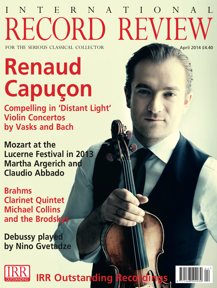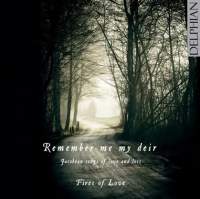Texte paru dans: / Appeared in:
*

International Record Review - (04//2014)
Pour
s'abonner / Subscription information
Delphian
DCD34129

Code-barres / Barcode : 0801918341298
After the very fine 'Chansons a Plaisir: Music from the time of Adrian le Roy' (DCD34063) and 'Love and Reconquest: Music from Renaissance Spain' (DCD34002) comes Scottish Early Music ensemble Fires of Love's latest release, 'Remember me my deir'. This time the focus is on both the music associated with King James VI of Scotland and the music he might have encountered in England upon his becoming King James I of that country in 1603. Consequently, this disc contains an attractive mix of Scottish music with a French accent and English music with an Italian accent.
What hasn't changed is Fires of Love's intelligent approach to programming and interpretation. The musical journey begins and ends with different versions of the haunting And he will not come again ‑ the first accompanied only by the barely audible stirrings of Gordon Ferries's Renaissance guitar, the second, sung to a melody based on Mad Tom of Bedlam, featuring both guitar and lute. The extremely versatile recorder player Jonathan Hugh‑Jones plays the second lute on many of the tracks, and even sings baritone on one ‑ as well as percussion.
In between is a selection of Scottish and English songs and instrumental pieces performed in a variety of arrangements and from a variety of sources. From the Straloch manuscript there are lute solos such as the very politically incorrectly named I longfor thy virginite; the Rowallan, Braye and Jane Pickeringe manuscripts also yield many lute and guitar pieces, such as the lute duet The Scottish Huntsupe and the Pavane (Passamezzo) and Gagliarda.
While much pleasure is also derived from songs both gay and melancholy, such as O sweet Oliver ... My bonny lass and Remember me, my deir, which feature the full ensemble of percussion, recorder, guitar and voice, some of the most pure, refined performances are those involving just voice with a simple guitar or lute accompaniment. Among my favourites are Francis Pilkington's well‑known Rest, sweet nymphs and the exquisite The cypress curtain of the night by Thomas Camp on, which at just over six minutes is also the longest item in the programme ‑ hardly a cause for complaint.
Here, as throughout, soprano Frances Cooper proves the most able and beguiling of interpreters, her diction crystal clear, her voice sweet and steady, her expression attuned to the subtlest affective potential of both music and the poetry. Ferries, as on any of his numerous solo recordings, is a relentless exploiter of the percussive and cantabile qualities of plucked strings, while Marcus Claridge and Hugh-Jones divide those qualities admirably between them, as befits their respective instruments. Together, the blending of timbres and tone colours is nothing short of perfect.
Cliquez l'un ou l'autre
bouton pour découvrir bien d'autres critiques de CD
Click either button for many other reviews


